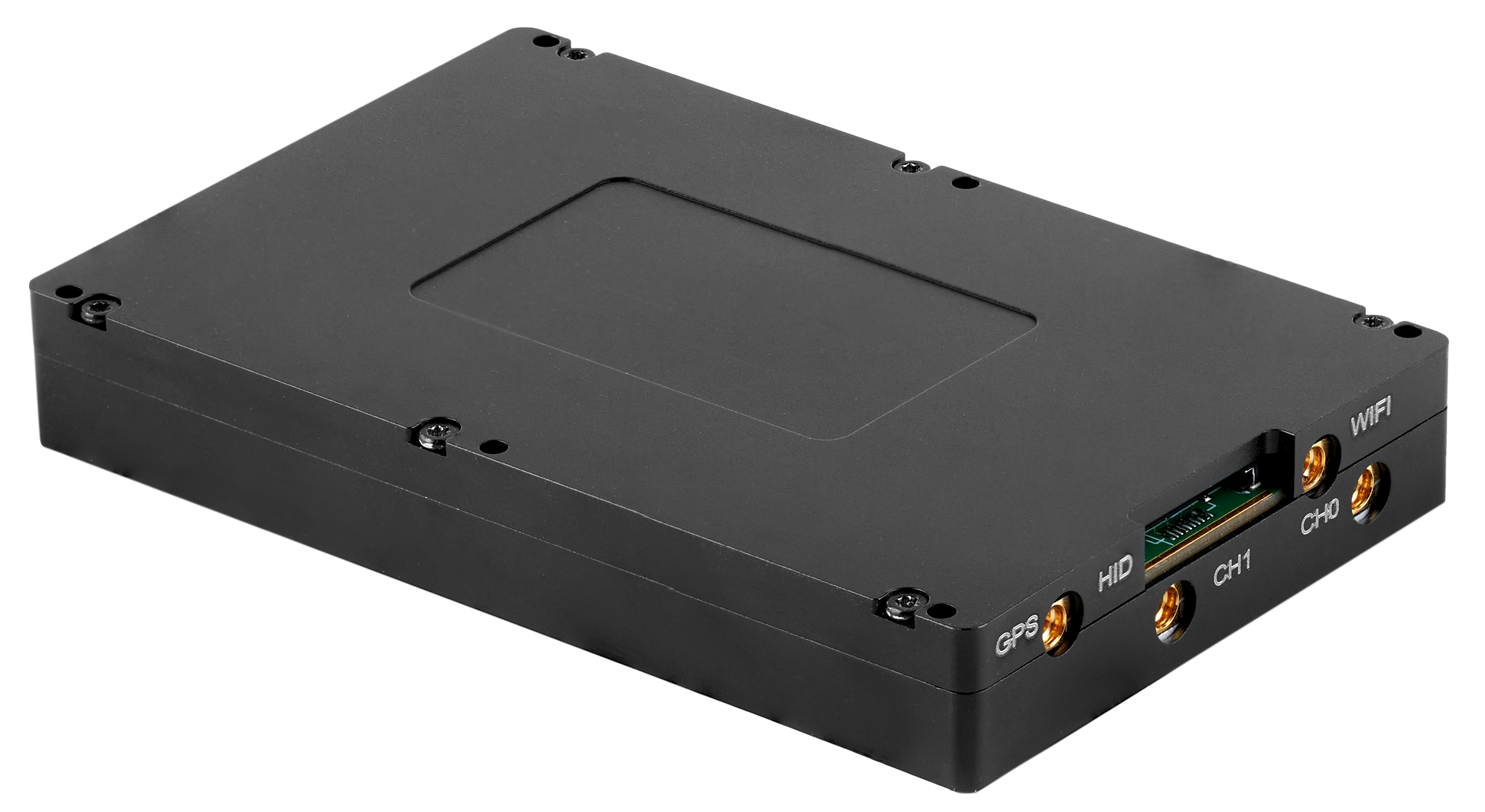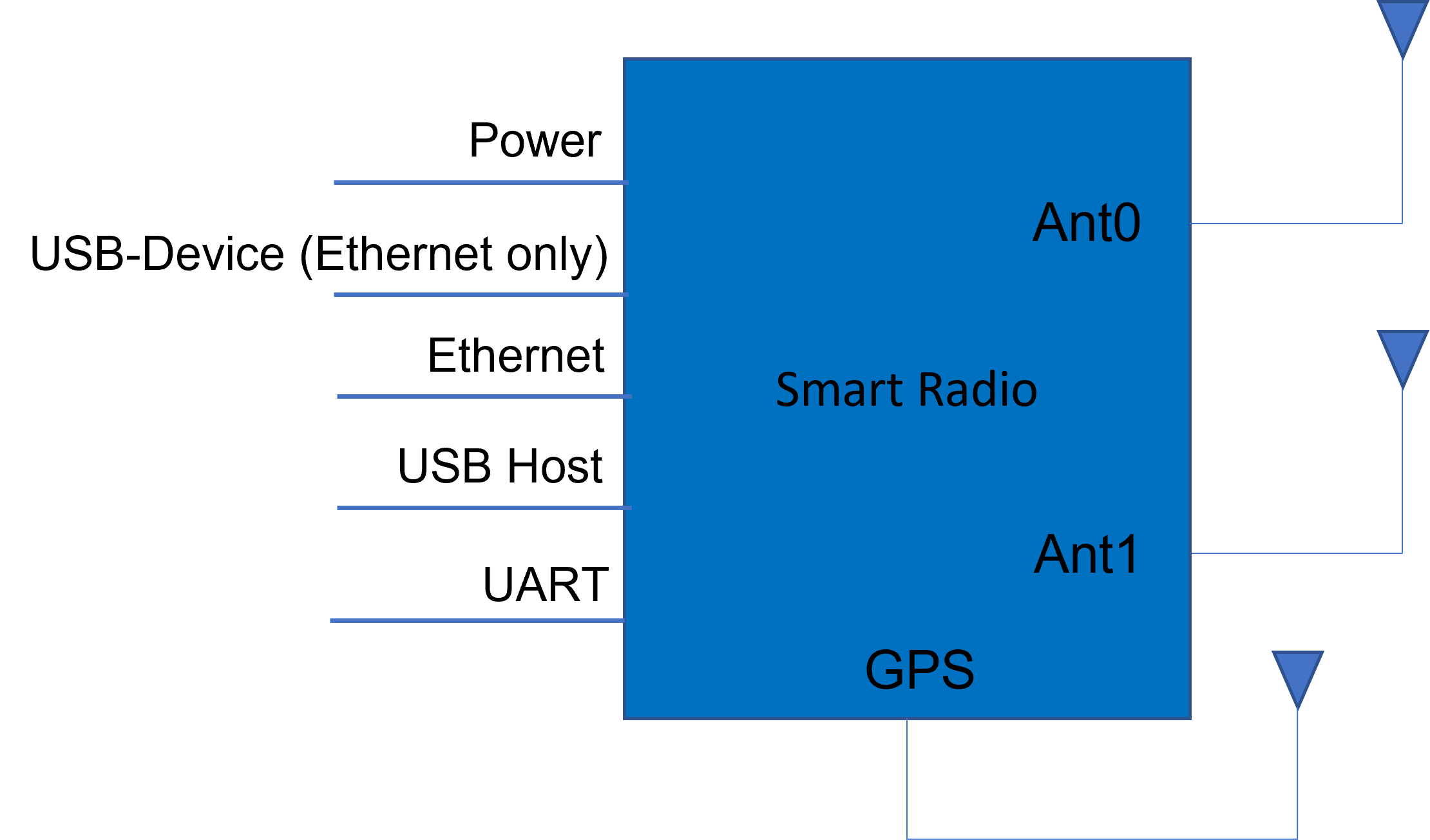Multiband OEM Mesh Rider Radio – 4940~5895 MHz (C-Band)
(PRELIMINARY)
Overview

The Multiband OEM VR-base-model Mesh Rider Radio operates in the VR-freqrange frequency range allowing it to be used VR-usage. Each device is a node on a long-range Mesh Rider network and uses Wi-Fi to bridge Tablets and Smartphones onto the network. The Multiband OEM Mesh Rider Radio is used to collaborate by streaming voice, video, and data on a fast, low latency, and encrypted network.
The Multiband OEM VR-base-model Mesh Rider Radio was designed to be embedded in an external chassis and uses small rugged MMCX (for RF) and JST-GH locking connectors.
As with all Mesh Rider Radio form factors, the Multiband OEM Mesh Rider Radio is available in many frequency bands between 900 MHz and 6 GHz freq range. This flexibility allows customers to use their industry specific frequency bands for deploying private wireless networks.
The Mesh Rider Radio employs Doodle Labs' patented Mesh Rider® technology with state-of-the-art RF and networking capabilities that enable communication further, faster, and more reliably than any comparable solution on the market. For example, optimized video streaming carries crystal clear 4K video while simultaneously carrying Ultra Reliable Low Latency (URLLC) command and control (C&C) data for machines.
For more information, please visit: https://doodlelabs.com/smart-radio/
Frequency Bands
| Band | Frequency Range |
|---|---|
| 4965-MHz | 4940-MHz to 4990 MHz FCC Part 90Y, Public Safety Band |
| 5500-MHz | 5150-MHz to 5895 MHz UNII Bands 1 - 4 |
Key Features - Mesh Rider Radio Platform
PERFORMANCE RF
PERFORMANCE NETWORKING
ADDITIONAL FEATURES
System Integration

The Mesh Rider Radio has been designed to be plug and play. Only USB and a power supply are required for integration.
Visit Doodle Labs Technical Library for extensive design-in documents.
Technical Specifications (VR-freqrange)
| Model Category | XTreme |
|---|---|
| ORDERING INFORMATION | |
| Radio Configuration | VR-mimo |
| Model # | VR-all-models |
| Antenna (Optional) | VR-antenna-kit |
| Evaluation Kit (Optional) | VR-eval-kit |
| Design-In Documentation | Doodle Labs Technical Library |
| PERFORMANCE OVERVIEW | |
| Data Throughput at 10-meter range with Attached 3 dBi Antennas (Indicative) | VR-throughput |
| Over the Air Data Encryption | 128-bit AES (Full throughput) 256-bit AES (12 Mbps max throughput) |
| FIPS Certification (Optional) | FIPS 140-3 |
| Operating Modes | WiFi Radio: AP, Client Mesh, WDS AP, WDS Client Bridged or Internet Gateway with NAT |
| Command & Control channel | Ultra-Reliable Low Latency Channel (URLLC). Latency 1.5-10 ms |
| Video Channel | Optimized video streaming with Unicast and Multicast transmission |
| RF SPECIFICATIONS | |
| Protocol Compatibility | Fully compatible with Doodle Labs Mesh Rider Waveform |
| Operating Bands (Software Selectable) | VR-operating-bands |
| Advanced Band Filters | Dedicated filters for high interference immunity |
| Max RF Power at SMA port (Software control) Each radio individually calibrated |
VR-RF-power |
| Channel Sizes (Software Selectable) |
VR-channel-sizes |
| Radio Data Rate | Auto adapting Modulation Coding Scheme (MCS0-15) |
| Antenna Signal Strength | -30 to -90 dBm (Recommended), Absolute Maximum= +12 dBm |
| RF Power Control | In 1 dBm steps, Tolerance ±1 dBm |
| Automatic Transmit Power Control (ATPC) | Intelligently adjusts the transmit power for very close range operation |
| Integrated Antenna Port Protection | Able to withstand open port, >10 KV (contact) and >15KV (open air discharge) as per IEC-61000-4-2 |
| Wireless Error Correction | FEC, ARQ |
| Receive Noise Figure | +4 dB |
| Receive Adjacent Channel Rejection (ACRR) | 34 dB @ MCS0 for 20 MHz channel (Typ) |
| Transmitter Adjacent Channel Leakage Ratio (ACLR) | < 28 dBr (Fc ± ChBW) |
| Transmitter Spurious Emission Suppression | < 40 dBc |
| Frequency Accuracy | ±10 ppm max over life |
| WI-FI HOTSPOT SPECIFICATIONS | |
| WiFi Standard | IEEE 802.11n, 1x1 SISO |
| Frequency Range | VR-wifi-freqrange |
| RF Power Output (Typ) | 50 mW (17 dBm) EIRP |
| Channel Size | 20 MHz |
| Radio Data Rate | Auto adapting Modulation Coding Scheme (MCS 0-7) |
| Antenna Signal Strength | -25 to -85 dBm (Recommended), Absolute Maximum= +12 dBm |
| RF Power Control | In 1 dBm steps, Tolerance ±1 dBm |
| Wireless Error Correction | FEC, ARQ |
| NETWORKING SPECIFICATIONS | |
| Mesh Router | Self-Forming/Self-Healing, Peer to Peer |
| Custom Software Package Manager | Image Builder, OPKG, ipk |
| Radio Management | Web GUI (HTTPs), SSH and JSON-RPC |
| Access control | Password, MAC, IP, Port filtering |
| Supported Protocols | IPv6, QoS, DNS, HTTPS, IP, ICMP, NTP, DHCP |
| Software Upgrade | Over the air software upgrade supported |
| HARDWARE SPECIFICATIONS | |
| Power Input | 6V - 24V, USB-PD Compliant |
| DC Power Consumption | VR-DC-power |
| Dimensions | VR-dimensions |
| Mesh Rider Antenna Ports | VR-ant-conn |
| Host Interface | VR-interfaces |
| Temperature range (Operating) | Industrial: -30°C to +70°C * System's thermal design should ensure that the radio's case temperature is maintained within these specifications. |
| Temperature range (Non-Operating) | -40°C to +100°C |
| Ingress Protection | VR-ip-rating |
| Relative Humidity | 5% to 95% noncondensing |
| Shock and Vibration Resistance | Compliant to MIL-STD-810H for high shock and vibration |
| Reliability | Extreme Reliability, IPC Class 2 standard with Class 3 options |
| WiFi Hotspot Antennas | VR-wifi-ant-conn |
| GPS Features | Simultaneous multiple constellations (GPS/SBAS/Galileo/Glonass/BeiDou/QZSS) Receive Sensitivity -167 dBm, Max. Velocity 500m/sec ± 0.05m/S, Heading ± 0.3 degrees, Position Accuracy 2m |
| Integrated GPS Module with LNA | u-blox MAX-M8 series Concurrent GNSS Module (u-blox.com) |
| GPS Antenna | VR-gps-ant-conn |
| Integrated CPU | MIPS 24Kc, 540 MHz, 32MB Flash, 64MB DDR2 RAM |
| ESD Protection | IEC 61000-4-2 test criteria, Level 3 (±6KV) for Contact Discharge and Level 4 (±15KV) for Air Discharge |
| MTBF | >235k hours (25 years) |
| Life Cycle Planning | Extended lifespan with 7 years guaranteed availability |
| REGULATORY INFORMATION | |
| J/F-12 Certification | VR-jf12 |
| FCC ID | VR-fcc |
| Industry Canada (IC) | VR-ic | CE | VR-ce | Japan (MIC) | VR-jp |
| Regulatory Requirements | Designed and verified to meet various regulatory requirements. Formal testing and approval are required for the Integrator's antenna type. The Integrator is responsible for obtaining all regulatory approvals in target markets for the finished product. | RoHS/WEEE Compliance | Yes. 100% Recyclable/Biodegradable packaging |
| EXPORT INFORMATION | |
| ECCN Code | 5A992 |
| HS Code | 85256010 |
| ADDITIONAL RF SPECIFICATIONS | ||||
|---|---|---|---|---|
| MCS Rate | Modulation | Combined Output Power (dBm) | Sensitivity (dBm) | UDP Throughput (Mbps) |
| 0 | BPSK (1/2) | VR-p0 | VR-s0 | 5.4 |
| 1 | QPSK (1/2) | VR-p1 | VR-s1 | 10.62 |
| 2 | QPSK (3/4) | VR-p1 | VR-s2 | 15.66 |
| 3 | 16-QAM (1/2) | VR-p1 | VR-s3 | 20.52 |
| 4 | 16-QAM (3/4) | VR-p4 | VR-s4 | 29.88 |
| 5 | 64-QAM (2/3) | VR-p5 | VR-s5 | 38.88 |
| 6 | 64-QAM (3/4) | VR-p6 | VR-s6 | 43.11 |
| 7 | 64-QAM (5/6) | VR-p7 | VR-s7 | 47.34 |
| 8 | BPSK (1/2) | VR-p0 | VR-s8 | 10.53 |
| 9 | QPSK (1/2) | VR-p1 | VR-s9 | 20.43 |
| 10 | QPSK (3/4) | VR-p1 | VR-sa | 29.7 |
| 11 | 16-QAM (1/2) | VR-p1 | VR-sb | 38.52 |
| 12 | 16-QAM (3/4) | VR-p4 | VR-sc | 54.72 |
| 13 | 64-QAM (2/3) | VR-p5 | VR-sd | 69.3 |
| 14 | 64-QAM (3/4) | VR-p6 | VR-se | 76.14 |
| 15 | 64-QAM (5/6) | VR-p7 | VR-sf | 82.8 |
Note 1: Performance based on 20-MHz bandwidth
Note 2: Sensitivity and throughput are approximately proportional to bandwidth.
FCC Statement
Changes or modifications not expressly approved by the party responsible for compliance could void the user's authority to operate the equipment.
This equipment has been tested and found to comply with the limits for a Class B digital device, pursuant to Part 15 of the FCC Rules. These limits are designed to provide reasonable protection against harmful interference in a residential installation. This equipment generates uses and can radiate radio frequency energy and, if not installed and used in accordance with the instructions, may cause harmful interference to radio communications. However, there is no guarantee that interference will not occur in a particular installation. If this equipment does cause harmful interference to radio or television reception, which can be determined by turning the equipment off and on, the user is encouraged to try to correct the interference by one or more of the following measures:
- Reorient or relocate the receiving antenna.
- Increase the separation between the equipment and receiver.
- Connect the equipment into an outlet on a circuit different from that to which the receiver is connected.
- Consult the dealer or an experienced radio/TV technician for help
This device complies with part 15 of the FCC rules. Operation is subject to the following two conditions (1)this device may not cause harmful interference, and (2) this device must accept any interference received, including interference that may cause undesired operation
IC Statement
This device complies with Industry Canada’s licence-exempt RSSs. Operation is subject to the following two conditions:
- This device may not cause interference; and
- This device must accept any interference, including interference that may cause undesired operation of the device.
The term "IC: " before the certification/registration number only signifies that the Industry Canada technical specifications were met. This product meets the applicable Industry Canada technical specifications.
Le présent appareil est conforme aux CNR d'Industrie Canada applicable aux appareils radio exempts de licence. L'exploitation est autorisée aux deux conditions suivantes : (1) l'appareil ne doit pas produire de brouillage, et (2) l'utilisateur de l'appareil doit accepter tout brouillage radioélectrique subi, même si le brouillage est susceptible d'en compromettre le fonctionnement
CE Statement
This is a Class A product. In a domestic environment, this product may cause radio interference, in which case the user may be required to take adequate measures.
CAUTION: To comply with the Europe CE requirement, this device must be installed with CE certified computer equipment which meet with Class A limits. Be aware that outdoor installations require special attention and will only be handled by trained and qualified installation personnel.
All cables used to connect this device must be shielded and grounded. Operation with non-certified computers or incorrect cables may result in interference to other devices or undesired effects to the product. Particular attention has to be given allowed operational frequencies.